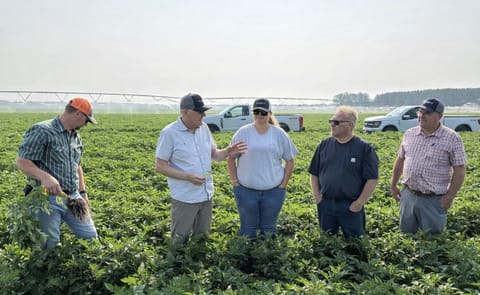INIA and Rustikas to cooperate on the development of new Uruguayan potato varieties
INIA and Rustikas to cooperate on the development of new Uruguayan potato varieties

The National Institute for Agricultural Research (INIA) in Uruguay recently signed an agreement with the local agrobiotechnology company Rustikas to work together on the selection, evaluation, validation and production of seeds of new potato varieties of Uruguayan origin.
The alliance will work towards a continued genetic improvement of new potato varieties. The partners will also strive to bring about an efficient Uruguayan based seed production system and supply a national multiplication network.
The team at Rustikas is committed to ongoing innovation in genetics and plant propagation with a uniquely Uruguayan footprint. Their goal is to develop virus-free potato seeds that stand out for their hardiness and vigor; high field performance, as well as the efficient use of farm inputs and its nutritional properties.
Along the same lines, INIA works on the genetic improvement of potatoes and aims to generate cultivars adapted to local conditions, giving priority to those with a clear resistance to diseases, ranking high for their nutritional value, and excellent for consumption by consumers.
Among the potato varieties presently available on the Uruguayan market today are INIA Arequita, INIA Daymán and INIA Guaviyú. It is anticipated that the new alliance will in due time release new varieties for the Uruguayan market – varieties that will have a sure positive impact on different levels of the potato production chain.
Ing. Agr. Alfonso Grela, Agronomist and Co-founder of Rustikas, said it will be the first time that a company in Uruguay uses aeroponic technology to offer minitubers to farmers and seed growers – seed that contains 100% INIA genetics.
Alfonso Grela:
"Aeroponics is a specialized production system where the roots of the potato plants are suspended in the air in a dark environment and "spoon fed" with a constant mist of water and nutrients. Among the benefits of aeroponics is the high rate of propagation per plant and the excellent sanitary conditions under which it is grown."
Ing. Agr. Alfonso Grela also pointed out that an aeroponics system is used during the initial multiplication stage, which is done in a greenhouse protected with an anti-aphid mesh (vector insects) and all necessary sanitary measures to ensure virus and disease free plantlets.
Alfonso Grela:
"With this system and technology, minitubers are produced which are then transferred to the field for a controlled multiplication process for three more generations until the eventual seed planted by farmers is obtained."
In a brief virtual launch meeting with the presence of the Board of Directors of INIA, Ing. Agr. Matías González Arcos, principal researcher and leader of the Institute’s vegetable genetic improvement project, praised the importance of this kind of essential alliance to promote technology and boost innovation.
Ing. Agr. Alfonso Grela made reference to the challenges that need to be overcome in improving the availability of high-quality national potato genetics and seed. Despite these challenges, he confirmed that Rustikas is:
"... highly committed in providing the potato production industry with a competitive edge, and aims constantly to improve on the final product offer in the marketplace."
At the closing of the signing ceremony, Ing. Agr. José Bonica, president of INIA, expressed his support for the initiative, and highlighted the importance of overcoming the challenges faced by the potato industry as such, but also human society in a broader sense.









